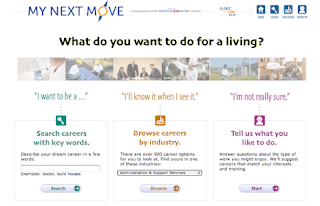Are you prepared for the biggest hiring season of the year? That’s right, January kicks it off! Job seekers should use every resource available to them during their job search. You will want to start your research now to hit the ground running in January. The following websites contain an abundance of valuable information for job seekers.
O*NET Online (http://www.onetonline.org/)
Created for the U.S. Department of Labor/Employment and Training Administration by the National Center for O*NET Development. The O*NET program is “the nation’s primary source of occupational information,” according to the site. It contains information on hundreds of occupations and is available to job seekers at no cost.
Every occupation requires unique knowledge, skills, and abilities. These occupational characteristics are outlined on the site. The occupational descriptions, which include explanations of day-to-day work, along with qualifications and interests of the typical worker, allow job seekers to identify unique positioning opportunities for themselves in their job search.
You can also access the O*NET® Interest Profiler, a free tool (available for immediate download) to assess your occupational interests. The tool offers personalized career suggestions based on your interests and level of work experience.
Access the tool here: http://www.onetcenter.org/IP.html
My Next Move (http://www.mynextmove.org/)
You can start your research on an O*NET affiliated site, My Next Move. The site is an interactive tool for job seekers to learn more about career options. It includes descriptions, skills, and salary information for more than 900 professions. You can identify careers through keyword search, by browsing industry classification, or through the O*NET Interest Profiler.
My Next Move is maintained by the National Center for O*NET Development under the sponsorship of the U.S. Department of Labor/Employment and Training Administration.
When you identify a profession, you can assess the knowledge, skills, and abilities required for success in the role. These can often provide guidance for positioning yourself. The “Personality” and “Technology” sections also give insight into your personal positioning.
The “On the Job, You Would” information includes common job functions. Look to see if these are areas where you excel — this can be a point of differentiation.
Also check out the “Also Called” information under the occupation for related job titles you can use in your personal positioning tagline.
America’s Career InfoNet (http://www.careerinfonet.org/)
This website is affiliated with the U.S. Department of Labor’s CareerOneStop program. The website includes occupation and industry information, salary data, career videos, education resources, self-assessment tools, and career exploration assistance.
Occupational Outlook Handbook (http://www.bls.gov/ooh/)
The Occupational Outlook Handbook (OOH) provides information on what workers do, working conditions, what qualifications are required for success in the position, pay, job outlook, similar occupations, and sources of additional information for research for more than 300 occupational profiles.
To find an occupation, browse the occupational group of interest on the left-hand side of the website, or use the “A-Z Index” (if you know the specific occupation). You can also enter a job title into the “Search Handbook” box at the top of the site. You can also search for occupations by pay range, education level, training, projected number of new jobs, and projected job growth rate — using the “Occupation Finder” or occupation selector drop-down menus on the home page. If you can’t find an occupation you are interested in, look in the alphabetical index, using similar occupational titles to search for an occupation.
Glassdoor(http://www.glassdoor.com/)
You can also research your prospective employer to identify how to effectively position yourself to work at that specific company. Glassdoor is an excellent way to assess what is important to the employer and how you might fit in.
Conducting research on jobs, companies, industries, etc. is essential in today’s job search. These websites and others provide more than just job postings, they are extremely helpful to get more in-depth information, and result in a higher success rate for job seekers who use them.





